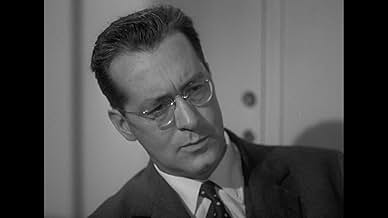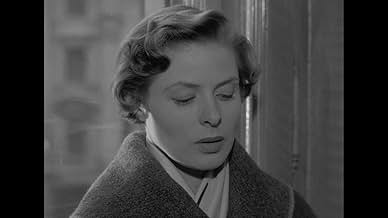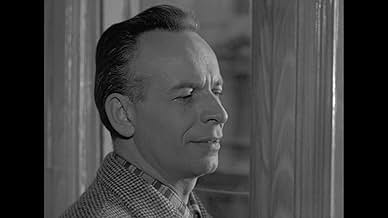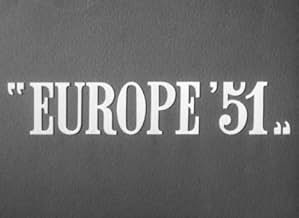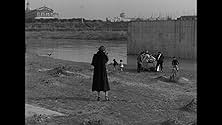CALIFICACIÓN DE IMDb
7.4/10
5.1 k
TU CALIFICACIÓN
Una mujer adinerada se obsesiona con el humanitarismo cuando su hijo pequeño muere después de suicidarse.Una mujer adinerada se obsesiona con el humanitarismo cuando su hijo pequeño muere después de suicidarse.Una mujer adinerada se obsesiona con el humanitarismo cuando su hijo pequeño muere después de suicidarse.
- Dirección
- Guionistas
- Elenco
- Premios
- 4 premios ganados y 1 nominación en total
Carlo Hintermann
- Extra
- (sin créditos)
Antonio Pietrangeli
- Psichiatra
- (sin créditos)
Rossana Rory
- Infermiera della casa di cura
- (sin créditos)
Opiniones destacadas
Do you remember when film featured up close photography, colorless images allowing character interaction to be the foreground, and spoken dialogs with noticeable pauses? Do you remember the last time a film haunted you? Correct
it simply flashed to mind without your invitation! If you can touch any of these viewing memories, this film may be worthy of 108 minutes.
Europe '51 is directed by Roberto Rossellini, and stars the stunning master of nuanced emotion, Ingrid Bergman. The 1952 film is set in Rome, post WWII, and features wonderful set designs to distinguish the comfortable life and the dire struggles known to the rest of us.
As Irene, Bergman undergoes a metamorphosis that will beckon the dark experience of an unexpected loss of a beloved, and the consequential deep fall into emptiness. Irene is first introduced to us as the consummate hostess with a natural grace and instinctive flair for entertaining. She ignores the voice of her only son repeatedly to fulfill her social obligations. Bonded by their time of closeness under the threat of air raids, Irene is no longer burdened to protect and comfort her son in the present post-war calm.
Her 10 year old son, Michele, takes his life after repeated, failed attempts to gain his mother's affection and attention. Irene is paralyzed by the loss, and her husband, George, accommodates her every wish until he comes to think she is having a love affair. The grieving mother finds solace in service to those in need, and her family is bewildered. Her long absences from home, loss of interest in social engagements, and avoidance of her husband leave her family troubled.
Irene is transitioning spiritually as a means to heal her loss. She is introduced to a family in need of assistance, and she finds great joy in acts of compassion. Irene assists this family to secure treatment for their sickly son, she then befriends a single mother of six dependents, and tirelessly administers care to a young, isolated prostitute whose life is yielding quickly to tuberculosis. Irene's deeds are in conflict with her social position, and neither her husband nor her mother can compel her return to them. Irene has become a passionate, driven arm of charity in service to her community. She can not return to the life she knew prior to the loss of her young, beloved son. Her family can not understand the sweeping changes Irene has internalized. They confine her to a mental institution. She accepts this placement, and silently radiates a saintly mercy as she encounters the helplessness of the other patients.
Fortunately, Rossellini allows you to script your own ending as you look upon Irene from behind the confinement of cell bars at the mental institution. She has been visited by her family, and the family of the sickly boy she assisted. After your viewing, it would be good to hear from you.
Europe '51 is directed by Roberto Rossellini, and stars the stunning master of nuanced emotion, Ingrid Bergman. The 1952 film is set in Rome, post WWII, and features wonderful set designs to distinguish the comfortable life and the dire struggles known to the rest of us.
As Irene, Bergman undergoes a metamorphosis that will beckon the dark experience of an unexpected loss of a beloved, and the consequential deep fall into emptiness. Irene is first introduced to us as the consummate hostess with a natural grace and instinctive flair for entertaining. She ignores the voice of her only son repeatedly to fulfill her social obligations. Bonded by their time of closeness under the threat of air raids, Irene is no longer burdened to protect and comfort her son in the present post-war calm.
Her 10 year old son, Michele, takes his life after repeated, failed attempts to gain his mother's affection and attention. Irene is paralyzed by the loss, and her husband, George, accommodates her every wish until he comes to think she is having a love affair. The grieving mother finds solace in service to those in need, and her family is bewildered. Her long absences from home, loss of interest in social engagements, and avoidance of her husband leave her family troubled.
Irene is transitioning spiritually as a means to heal her loss. She is introduced to a family in need of assistance, and she finds great joy in acts of compassion. Irene assists this family to secure treatment for their sickly son, she then befriends a single mother of six dependents, and tirelessly administers care to a young, isolated prostitute whose life is yielding quickly to tuberculosis. Irene's deeds are in conflict with her social position, and neither her husband nor her mother can compel her return to them. Irene has become a passionate, driven arm of charity in service to her community. She can not return to the life she knew prior to the loss of her young, beloved son. Her family can not understand the sweeping changes Irene has internalized. They confine her to a mental institution. She accepts this placement, and silently radiates a saintly mercy as she encounters the helplessness of the other patients.
Fortunately, Rossellini allows you to script your own ending as you look upon Irene from behind the confinement of cell bars at the mental institution. She has been visited by her family, and the family of the sickly boy she assisted. After your viewing, it would be good to hear from you.
EUROPA 51 is an odd film. Irene (Bergman) is the wife and mother in a rich family, in affluent surroundings. Hers seems a perfect world, but she is too self-centered to realize that her son needs attention and love.
EUROPA 51 reflects the situation in Europe in 1951, six years after the end of WW II. Work is scarce. poverty is rife, the impersonality of industry is overwhelming society, but against this general background some personal problems stick out: Irene focuses on being an adroit host and having her house spotlessly clean; her husband wrongly fears that she is cheating on him with a journalist; and their son feels ignored and throws himself down a staircase, with fatal consequences.
Irene feels very guilty about losing her son, moves away from home, and descends into the underworld of poverty, helping people in the process. This is where a memorable performance surfaces, by Giuletta Masina, the wife of famous Italian director Federico Fellini, who injects life into the whole movie, in contrast with Irene's increasingly quiet soul.
The fact that her own husband and circle of friends see her as approaching madness reflects the tragedy that tends to pursue the individual who dares to show feelings and concerns in relation to his/her fellow neighbor. In this case, Irene helps a number of people, takes genuine interest in their predicaments, but her reward is questionable: she sees her husband leave her behind the bars of a psychiatric ward, feeling intolerably lonely, but common people see her as a saint.
Ultimately, it is a film in equal measure wise and wayward. Perhaps I cannot avoid looking at it with 21st Century eyes, and I lack knowledge about the mindset of Italian society in the early 1950s. Still, I had a problem attaching credibility to this film.
That said, Bergman was never more physically stunning than in this film, and her acting is first class.
Director Rossellini shows steely determination driving forward this unusual film. Photography is quite good. Script is generally competent. Acting by Bergman and Masina is excellent, the rest of the cast, Knox included, does not shine so much.
The film's main flaw is that it is overlong by some 20 minutes, but any Rossellini-Bergman collaboration deserves attentive watching.
EUROPA 51 reflects the situation in Europe in 1951, six years after the end of WW II. Work is scarce. poverty is rife, the impersonality of industry is overwhelming society, but against this general background some personal problems stick out: Irene focuses on being an adroit host and having her house spotlessly clean; her husband wrongly fears that she is cheating on him with a journalist; and their son feels ignored and throws himself down a staircase, with fatal consequences.
Irene feels very guilty about losing her son, moves away from home, and descends into the underworld of poverty, helping people in the process. This is where a memorable performance surfaces, by Giuletta Masina, the wife of famous Italian director Federico Fellini, who injects life into the whole movie, in contrast with Irene's increasingly quiet soul.
The fact that her own husband and circle of friends see her as approaching madness reflects the tragedy that tends to pursue the individual who dares to show feelings and concerns in relation to his/her fellow neighbor. In this case, Irene helps a number of people, takes genuine interest in their predicaments, but her reward is questionable: she sees her husband leave her behind the bars of a psychiatric ward, feeling intolerably lonely, but common people see her as a saint.
Ultimately, it is a film in equal measure wise and wayward. Perhaps I cannot avoid looking at it with 21st Century eyes, and I lack knowledge about the mindset of Italian society in the early 1950s. Still, I had a problem attaching credibility to this film.
That said, Bergman was never more physically stunning than in this film, and her acting is first class.
Director Rossellini shows steely determination driving forward this unusual film. Photography is quite good. Script is generally competent. Acting by Bergman and Masina is excellent, the rest of the cast, Knox included, does not shine so much.
The film's main flaw is that it is overlong by some 20 minutes, but any Rossellini-Bergman collaboration deserves attentive watching.
10EdgarST
After filming stories about the resistance of the Italian people during the Fascist and Nazi regimes, and the story of a German child against the barren landscape of Berlin after the war, Roberto Rossellini made a movie about Francis of Assisi and started a love and work relationship with actress Ingrid Bergman. In his evolution to works like 'The Rise To Power of Louis XIV', he made a series of melodramas with Bergman, of which 'Stromboli' and 'Voyage To Italy' are always considered the most important. Add to that list this fine drama, in which bourgeois housewife Irene suffers a transformation when confronted with the misery of those who had not been benefited with the European 'economic miracle.' Considered a saint by those she helped (Giulietta Masina included), Rossellini makes quite obvious that Irene reached that state by detouring from the usual roads she took as the wife of a prominent industrialist (Alexander Knox.) Not only has she a Marxist cousin who curiously does not preach his philosophy, but gives Irene advise whenever she talks about the misery she is discovering- but she also ventures into the slums, helps a single mother, a prostitute and a thief. The final section of the movie reminded me of 'María de mi corazón', a latter film written by Gabriel García Márquez, based on a real story. As in 'María
' there is neither opportunity nor chance to explain clearly what she's going through to husband or authorities, leading her to a dead end of desperation. Only sainthood will save her from the dehumanization around her.
Ingrid Bergman highlights in this compelling melodrama about a burgeois mother who becomes aware of the unfortunate social classes after the loss of a son. The film goes a step further and can also be read as the social portrait of the European status quo after the Great War. Some dialogs may appear evident and simplistic as far as ideology is concerned, but the impressive conclusion and the characteristic Rossellini's style makes it one of the most interesting films of his director and a valuable document about psychological war consequences which hasn't loose relevance.
"Europa '51" is one of the most unique films I have seen and for that reason alone, it's well worth seeing.
The story begins oddly. A couple have a son they describe as 'unusually sensitive'. In reality, he clearly is mentally ill as he ends up killing himself even though he is a young boy. While very rare, such things do occur and not surprisingly it radically impacts on his parents. The father becomes more stoic and distant and the mother (Ingrid Bergman) begins to notice the plight of the poor and begins spending more and more time with them helping them with their problems. After a while, the wife is home less and less (possibly in response to her aloof husband) and he assumes she must be insane and acts accordingly.
The mother's reaction to grief and guilt about her son's death is the driving force in this film. But it's also interesting how doctors, priests and the police react to the lady's philanthropy. Overall, a tough film to describe but well acted and never dull.
By the way, the mother of six in the film (Giulietta Masina) was the real life wife of the famed Italian director, Fellini. Here she is quite good in this supporting role.
The story begins oddly. A couple have a son they describe as 'unusually sensitive'. In reality, he clearly is mentally ill as he ends up killing himself even though he is a young boy. While very rare, such things do occur and not surprisingly it radically impacts on his parents. The father becomes more stoic and distant and the mother (Ingrid Bergman) begins to notice the plight of the poor and begins spending more and more time with them helping them with their problems. After a while, the wife is home less and less (possibly in response to her aloof husband) and he assumes she must be insane and acts accordingly.
The mother's reaction to grief and guilt about her son's death is the driving force in this film. But it's also interesting how doctors, priests and the police react to the lady's philanthropy. Overall, a tough film to describe but well acted and never dull.
By the way, the mother of six in the film (Giulietta Masina) was the real life wife of the famed Italian director, Fellini. Here she is quite good in this supporting role.
¿Sabías que…?
- TriviaThe square Irene and Andrea drive to is the Campidoglio in Rome. The equestrian statue is of Marcus Aurelius, emperor and stoic philosopher.
- ErroresWhen Michele falls down the stairs, his parents rush to the car to get him to the hospital. When his mother finds him, she is wearing the white gown she wore at the dinner. When they first arrive at the hospital, she has a fur coat on. A few hours later, suddenly she has changed into a grey suit.
- Citas
Irene Girard: It is just that the love we feel for those closest to us, for those who should be and maybe really are dearest to us, suddenly isn't enough. It seems too selfish, too narrow. So, that we feel the need to share it, to make our love bigger until it embraces everyone.
- Versiones alternativasIngrid Bergman, Alexander Knox and the other English-speaking actors dub their own voices into English for the English version.
- ConexionesEdited into Damned! Daney (1991)
- Bandas sonorasBésame Mucho
Written by Consuelo Velázquez
Selecciones populares
Inicia sesión para calificar y agrega a la lista de videos para obtener recomendaciones personalizadas
- How long is Europe '51?Con tecnología de Alexa
Detalles
Taquilla
- Total a nivel mundial
- USD 9,381
- Tiempo de ejecución1 hora 58 minutos
- Color
- Relación de aspecto
- 1.37 : 1
Contribuir a esta página
Sugiere una edición o agrega el contenido que falta

Principales brechas de datos
By what name was Su gran amor (1952) officially released in Canada in English?
Responda
